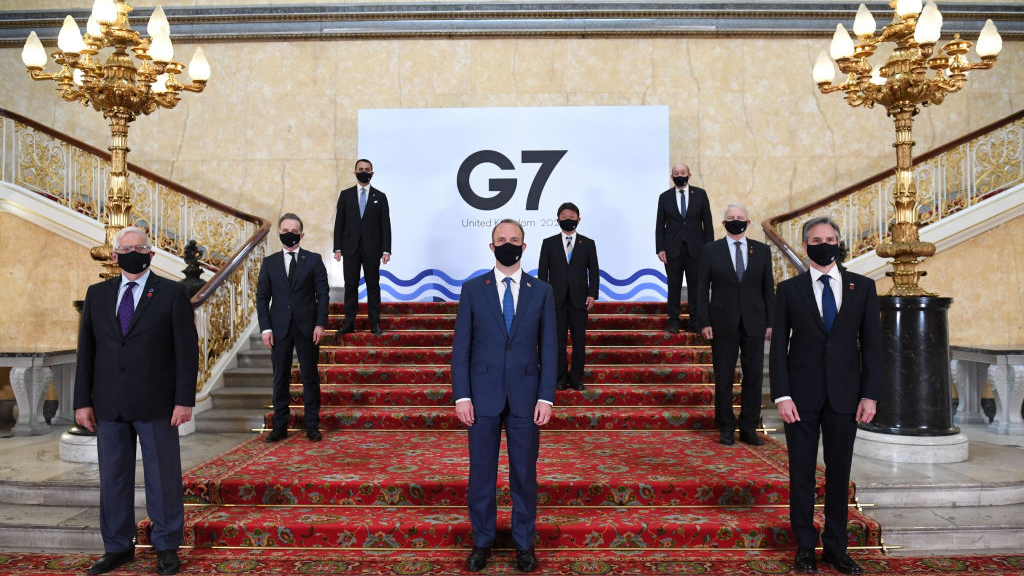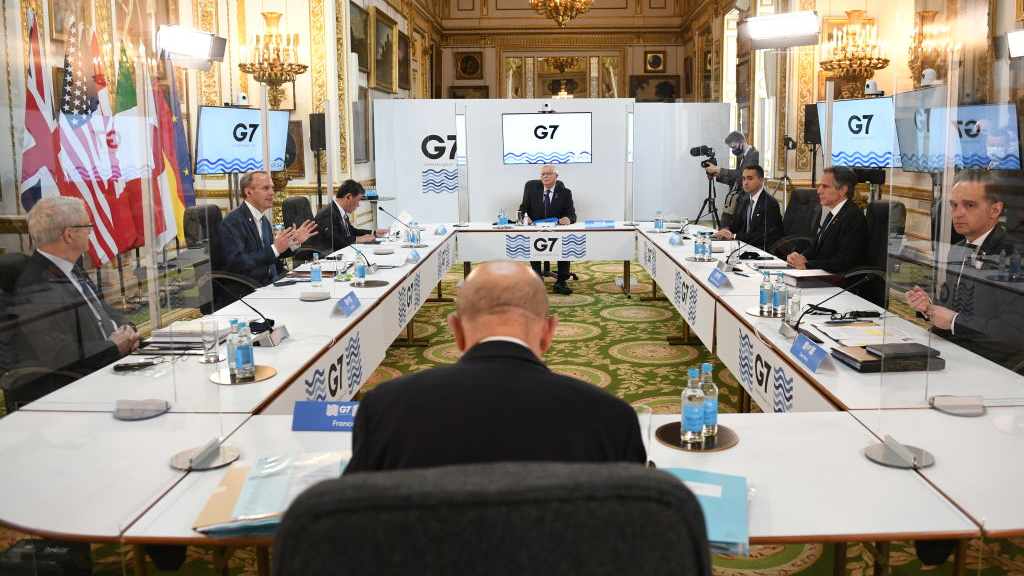
Representatives from G7 countries meet face-to-face for the first time in two years ahead of the G7 Leaders' Summit in London, England, May 4, 2021. /Getty
Representatives from G7 countries meet face-to-face for the first time in two years ahead of the G7 Leaders' Summit in London, England, May 4, 2021. /Getty
Editor's note: Bobby Naderi is a London-based journalist, guest contributor in print, radio and television, and a documentary filmmaker. The article reflects the author's opinions and not necessarily the views of CGTN.
On May 4, foreign ministers from the G7 nations met in London for face-to-face talks. The group is made up of the world's so-called advanced economies – the UK, Canada, France, Germany, Italy, Japan, and the United States.
Prior to the gathering, Britain's Foreign Secretary Dominic Raab met his U.S. counterpart Secretary of State Antony Blinken, with both pushing a firm line on the need for a more unified approach. On China, Raab said the "door was open to better ties, but it depends on behavior and deeds."
Blinken maintained that it was "not the U.S.' purpose to contain China, or hold it down." Here's the strange thing in an even stranger American world. He also misused national security justifications to conceal more mundane and questionable motives by calling for a revitalized and broadened alliance of G7 nations to defend the rules-based order from perceived threats posed by China and Russia.
Blinken's claims that China takes actions that challenge or undermine or seek to erode the rules-based order and not make good on its commitments are demonstrably unfounded. The facts behind Washington's decade-long gambit to undermine that order through trade and tariff wars or military interventions are not much better.
Whether it is the pandemic challenge, the disruptive impact on the global economy, or climate change, not a single one can be met by one country acting unilaterally, not even all the G7 countries combined. This includes any desperate attempt to cause China's GDP growth to fall through decoupling.
Setting the record straight
Do the Donald Trump administration's trade and tariff wars bear at least some responsibility for the subsequent global downturn and canceled international treaties? The evidence certainly appears to say so.
The former administration's excessive disregard toward its allies and their economic interests during trade frictions to "Make America Great Again" has evidently had disastrous consequences for the U.S in general and its allies in particular. The dark vision still undermines global recovery and makes the perceived allies' economies more vulnerable after the pandemic.
It offers a somber lesson on the limits of American amity projection, as well as clues toward reassessing whom the G7 countries ought to consider "threat" to the rules-based international order. Conversely, the true story of China contributing to that order serves as an opportunity to dissect the actions and policies of the Biden administration during the G7 talks but doing so factually and intelligently.

Representatives from G7 countries meet face-to-face for the first time in two years ahead of the G7 Leaders' Summit in London, England, May 4, 2021. /Getty
Representatives from G7 countries meet face-to-face for the first time in two years ahead of the G7 Leaders' Summit in London, England, May 4, 2021. /Getty
The road to global economic recovery is long and uneven. The G7 countries might be trying to prevent new coronavirus cases from stalling the fragile recovery from recession, but China's economy is growing and will end the year more influential than ever. The world's second-largest economy will avoid a recession, and its GDP is expected to grow. In contrast, the global economy as a whole will contract, according to projections from the World Bank, the International Monetary Fund and the Organization for Economic Cooperation and Development.
Teamwork begins by building trust
The G7's economic fortunes are mostly linked with those of China. In the absence of mutual trust, the G7's economic recovery share cannot tick up this year or the next. Blinken's apprehension, anxiety, perhaps even panic cannot change that factor.
The group needs to acknowledge China's accelerating growth and its importance to the G7's economies. Any attempt to decouple significantly from China could derail its recovery. It would sharply reduce the group's productivity and GDP growth. In contrast, the combined strength and cooperation of the Chinese and G7 economies would fuel a strong global recovery and expansion.
The Biden administration's foreign policy to disrupt China is the trigger that might feed into and worsen America's own economic downturn. Given that tarnished record, it would prolong the lingering contraction, thereby paving the way to further damage and business disruption in the G7 economies. In an interdependent world economy, the stakes are even higher.
The fact remains that further escalation could lead to missed opportunities in Chinese investment, trade, and finance in future technologies. That, in turn, has the potential to derail the fragile global post-pandemic recovery, prolong its adverse impact, and extend the lost years.
To put this in context, the time has come to embark on a new journey toward building a prosperous global economy in an all-around way. It makes economic sense for the G7 to inject more confidence and vitality into the cooperation with China to bring shared prosperity for all in the post-pandemic era. Only with sincere Sino-G7 cooperation can the global economic crisis be resolved.
The fact remains that even if the group "won," escalation with China would not benefit the G7's actual interests in the slightest. The unmistakable signs are that it is not meant to be won or to unlock the global economy; it is meant to be continuous. Increasingly, it is up to non-interventionists to abandon the zero-sum game to work with China in a rational and realistic manner. The absence of such coordination and cooperation could undermine collective efforts to overcome other global crises over the medium and longer-term.
(If you want to contribute and have specific expertise, please contact us at opinions@cgtn.com.)

